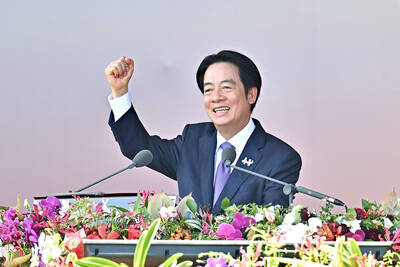Vietnam blasted into the satellite age yesterday when a rocket launch from South America propelled its first orbiter into space, allowing it to beam home telecoms data and TV signals.
From a command center set amid lush rice fields outside the capital, Hanoi, scientists tracked the Arianespace rocket as it propelled the Vinasat-1 on its path to hover 36,000km above the equator.
“This project is politically, economically and socially important,” Vietnamese Prime Minister Nguyen Tan Dung said soon after the launch, adding that it would help to “raise Vietnam’s image on the international stage.”

PHOTO: AP
The blast-off may only have been a small step for the European space agency in French Guiana, but it represents one great leap for Vietnam, a developing country with patchy phone coverage that only introduced the Internet a decade ago.
War-shattered and largely isolated until the early 1990s, Vietnam has seen a decade of rapid economic growth and is now racing to build the infrastructure to match the rising expectations of investors and its 86 million people.
ON THE MAP
The satellite project, which cost about US$300 million, “puts Vietnam on the map of the world for using satellite communications,” Deputy Information and Communications Minister Tran Duc Lai said.
“Demand for communications is now booming. Ten years ago we had only fixed telephones. Then we introduced mobiles. Since 1997 we started to introduce the Internet,” he said.
“Now there is very high demand. We have around 23 percent of people who can access the Internet. By 2010 the target is to reach 40 percent,” he said.
The nerve center of the satellite project is a walled compound packed with computers and a 13m wide satellite dish on Hanoi’s western urban outskirts in Ha Tay Province — an area where the old Vietnam meets the new.
In the shadow of the command and control center, where technicians’ eyes are peeled on flat-screen monitors, farmers use buffalo to plow rice fields and wood carvers make religious artifacts in nearby Son Dong village.
Yet only a few minutes’ drive away begins the urban sprawl of the capital, with construction crews and bulldozers forging a six-lane highway, lined with industrial plants, through centuries-old rice paddies.
Vinasat, a satellite made by US company Lockheed Martin, will seek to close the communication — and economic — gap between urban Vietnam and the other 70 percent of the population who live in the countryside, Lai said.
“The geography of Vietnam is very complicated [with] a lot of remote areas, a lot of high mountains, a lot of islands,” he said.
“A satellite can provide all kinds of services — telecom, Internet, radio and TV broadcasting — to every corner of the country,” he said.
Vietnam’s phone coverage has grown from 1 percent of the population in 1995 to 57 percent, with the largest gaps in the most remote areas, said Lam Hoang Vinh, vice president of the Vietnam Posts and Telecommunications Group.
“Thirty percent of people still don’t receive television,” he said. “With the satellite, people in mountainous and remote areas can now have the same facilities as people in urban areas.”
TELEMEDICINE
Vinasat, with a capacity equivalent to 120 TV channels, could also bring long-distance learning and telemedicine to the most isolated regions, said Jim Gribbon, Lockheed Martin’s vice president for Southeast Asia.
Vietnam got its first taste of satellite transmissions when a Russian Sputnik beamed in the 1980 Moscow Olympics, and it has so far been forced to lease satellite capacity from other countries.
With Vinasat now orbiting high above the Indonesia-Papua New Guinea border — casting a “footprint” that spans parts of Japan, Australia and Myanmar — Vietnam hopes to sell excess capacity to its neighbors.
“Other countries, like Thailand and Singapore, have already contacted us,” Vinh said.

The Ministry of the Interior (MOI) is to tighten rules for candidates running for public office, requiring them to declare that they do not hold a Chinese household registration or passport, and that they possess no other foreign citizenship. The requirement was set out in a draft amendment to the Enforcement Rules of the Public Officials Election and Recall Act (公職人員選舉罷免法 ) released by the ministry on Thursday. Under the proposal, candidates would need to make the declaration when submitting their registration forms, which would be published in the official election bulletin. The move follows the removal of several elected officials who were

FOUR DESIGNATED AREAS: Notices were issued for live-fire exercises in waters south and northwest of Penghu, northeast of Keelung and west of Kaohsiung, they said The military is planning three major annual exercises across the army, navy and air force this month, with the navy’s “Hai Chiang” (海強, “Sea Strong”) drills running from today through Thursday, the Ministry of National Defense said yesterday. The Hai Chiang exercise, which is to take place in waters surrounding Taiwan, would feature P-3C Orion maritime patrol aircraft and S-70C anti-submarine helicopters, the ministry said, adding that the drills aim to bolster the nation’s offshore defensive capabilities. China has intensified military and psychological pressure against Taiwan, repeatedly sending warplanes and vessels into areas near the nation’s air defense identification zone and across

SENATE RECOMMENDATION: The National Defense Authorization Act encourages the US secretary of defense to invite Taiwan’s navy to participate in the exercises in Hawaii The US Senate on Thursday last week passed the National Defense Authorization Act (NDAA) for Fiscal Year 2026, which strongly encourages the US secretary of defense to invite Taiwan’s naval forces to participate in the Rim of the Pacific (RIMPAC) exercise, as well as allocating military aid of US$1 billion for Taiwan. The bill, which authorizes appropriations for the military activities of the US Department of Defense, military construction and other purposes, passed with 77 votes in support and 20 against. While the NDAA authorizes about US$925 billion of defense spending, the Central News Agency yesterday reported that an aide of US

NATIONAL DAY: The ‘Taiwan Dome’ would form the centerpiece of new efforts to bolster air defense and be modeled after Israel’s ‘Iron Dome,’ sources said President William Lai (賴清德) yesterday pledged to strengthen the nation’s air defense capabilities and build a “T-Dome” system to create a safety net against growing military threats from China. “We will accelerate our building of the T-Dome, establish a rigorous air defense system in Taiwan with multi-layered defense, high-level detection and effective interception, and weave a safety net for Taiwan to protect the lives and property of citizens,” he said in his National Day address. In his keynote address marking the Republic of China’s (ROC) 114th anniversary, Lai said the lessons of World War II have taught nations worldwide “to ensure that